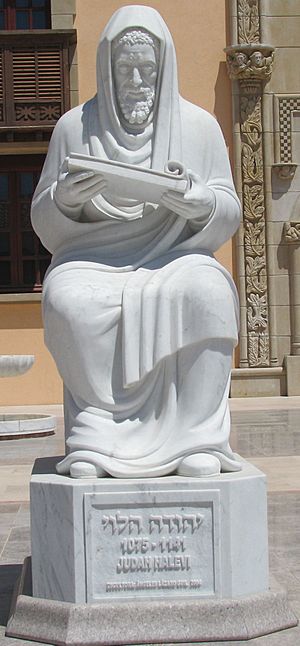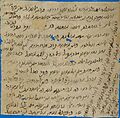Judah Halevi facts for kids
Quick facts for kids
Judah Halevi
|
|
|---|---|

Statue in Caesarea, Israel.
|
|
| Born | c. 1075 Toledo or Tudela, Al-Andalus
|
| Died | 1141 (66 years) |
|
Notable work
|
Sefer ha-Kuzari |
| Era | Medieval philosophy |
| Region | Jewish philosophy |
|
Main interests
|
Religious philosophy |
Judah Halevi (also known as Yehuda Halevi) was a famous Spanish Jewish doctor, poet, and philosopher. He was born in Spain around 1075. He passed away in 1141, soon after he arrived in the Holy Land.
Many people believe Halevi was one of the greatest Hebrew poets ever. He wrote both religious and everyday poems. Many of his religious poems are still used in Jewish prayers today. His most important book on philosophy was called Sefer ha-Kuzari.
Contents
Who Was Judah Halevi?
Judah Halevi was likely born in Toledo, Spain in 1075. He often said he came from a Christian area of Spain. As a young person, he probably went to Granada. This city was a major center for Jewish learning and writing at that time. There, he found a teacher named Moses Ibn Ezra.
Judah Halevi was very good at writing poetry from a young age. He learned about Jewish traditions and Arabic literature. He also studied Greek science and philosophy. As an adult, he worked as a doctor and was well-known. He also took part in Jewish community life. For some time, he lived in Toledo. He even complained that being a doctor kept him too busy for his studies.
Like many Jewish thinkers in Muslim Spain, Halevi wrote his prose in Arabic. But he wrote his poems in Hebrew. During the "Hebrew Golden Age" (10th to 12th centuries), he wrote more Hebrew poems than anyone else. Many people then, and now, see him as the best medieval Hebrew poet.
Judah Halevi's Family Life
We don't know much about Judah Halevi's personal life. His poems mention that he had a daughter. She later had a son, who was also named Judah. He might have had other children too. We know that Halevi and another famous writer, Abraham Ibn Ezra, knew each other well.
Why Judah Halevi Traveled to Israel
Judah Halevi lived in different cities in Spain. Sometimes he was in Christian Toledo, and other times in Islamic Spain. He was respected as a doctor and a leader. But his strong religious beliefs made him want to leave Spain. He wanted to spend his last days in Israel.
His reasons for traveling were likely many. He felt devoted to his faith and was curious. He might also have been sad after losing family and friends. He also worried about the future of Jewish people living outside of Israel. In his book, Kuzari, he wrote that true religious life is best lived in the Land of Israel. He believed that God's presence was strongest there.
His Journey to the Holy Land
Halevi sailed from Spain to Alexandria, Egypt. He arrived on September 8, 1140. Friends and fans were very happy to see him. He then went to Cairo and met important leaders. But he decided not to stay in Egypt.
He returned to Alexandria and sailed for Israel on May 14, 1141. We don't know much about his travels after this. It is thought that he died in July or August 1141. He may have reached Palestine before he passed away. A famous story says that an Arab horseman killed Halevi as he arrived in Jerusalem. However, this story first appeared about 450 years after his death.
During his last years, Halevi wrote many poems about his journey. These poems described his religious feelings and his worries. We know many details about his trip from letters found in the Cairo geniza.
Judah Halevi's Poetry
Judah Halevi spent his life writing poetry and thinking about philosophy. Some scholars call him the "most important poet in Judaism of all times." He wrote two main types of poems: sacred (religious) and profane (everyday).
Everyday Poems
Judah's everyday poems are about friendship, love, humor, and honoring people. He must have been a very likable person. Many famous people became his friends, even when he was young. These friends included poets, scholars, and leaders. He shared in their joys and sorrows. He once wrote: "My heart belongs to you, ye noble souls, who draw me to you with bonds of love."
Halevi also wrote many sad poems called elegies. These were often for friends who had passed away. He wrote five elegies for children who died. One writer thinks at least one of these might have been for his own child.
Halevi's job as a doctor also showed up in his poems. He wrote a prayer for doctors:
My God, heal me and I shall be healed.
Let not Thine anger be kindled against me so that I be consumed.
My medicines are from you, whether good
Or evil, whether strong or weak.
It is Thou who shalt choose, not I.
Of Thy knowledge is the evil and the fair.
Not upon my power of healing I rely.
Only for Thine healing do I watch.
Love Songs
His love songs show a happy and carefree youth. They are often about weddings and have a bright, Middle Eastern feel. They are also very pure. In Egypt, he wrote a beautiful poem about an old man still finding joy in love: "Wondrous is this land to see, With perfume its meadows laden, But more fair than all to me Is yon slender, gentle maiden. Ah, Time's swift flight I fain would stay, Forgetting that my locks are gray."
Riddles
Judah Halevi wrote more Hebrew riddles than anyone else. He wrote at least sixty-seven riddles. Most of them are short and about everyday things, animals, or plants. Here is an example:
- What is it that's blind with an eye in its head,
- But the race of mankind its use can not spare;
- Spends all its life in clothing the dead,
- But always itself is naked and bare?
(The answer is "A needle".)
Religious Poems
After living a life focused on worldly pleasures, Halevi had a big change in his thinking. He turned to religious themes in his poetry. This change was likely due to the historical events around him. He lived during the First Crusade and other wars. He saw new religious conflicts growing between Christians and Muslims. He may have felt that these "holy wars" were not good for Jewish people. Even though life was good for Jews in Spain then, he might have worried things would get worse.
Halevi also wrote a lot about his strong connection to the Jewish people. He felt their joys and sufferings as his own. He often wrote about the idea of Jewish people returning to the Land of Israel. He believed that Jewish life could only be perfect there. He expressed this in a poem:
- Lo! Sun and moon, these minister for aye; The laws of day and night cease nevermore: Given for signs to Jacob's seed that they Shall ever be a nation — till these be o'er. If with His left hand He should thrust away, Lo! with His right hand He shall draw them nigh.
Poems for Prayer
Halevi wrote many piyyutim, which are religious poems for prayer. His longest poem, a "Kedushah," asks the whole universe to praise God. These poems became very popular. They were used in synagogues as far away as India. Even Karaite Jews added some of his poems to their prayer books. So, almost every synagogue uses Judah's songs during services.
Judah also wrote several hymns for Shabbat, the Jewish day of rest. One of his most beautiful Shabbat hymns ends with these words:
On Friday doth my cup o'erflow / What blissful rest the night shall know
When, in thine arms, my toil and woe
Are all forgot, Sabbath my love!
'Tis dusk, with sudden light, distilled
From one sweet face, the world is filled;
The tumult of my heart is stilled
For thou art come, Sabbath my love!
Bring fruits and wine and sing a gladsome lay,
Cry, 'Come in peace, O restful Seventh day!'
Judah Halevi was seen as "the great Jewish national poet" by people of his time. Later scholars also recognized his importance. His poetry and writings are even seen as an early sign of support for Jewish nationalism.
Judah Halevi's Philosophy
Judah Halevi believed that we can connect with God through tradition and faith. He felt this was more important than deep philosophical thinking. His ideas were similar to those of a Muslim thinker named al-Ghazali. However, Judah Halevi did not like Islam.
Like al-Ghazali, Judah tried to free religion from complex philosophical ideas. Earlier thinkers like Saadia Gaon had mixed religion with philosophy. Judah Halevi wrote a book in Arabic called Kitab al-Ḥujjah wal-Dalil fi Nuṣr al-Din al-Dhalil. This book is better known by its Hebrew name, Sefer ha-Kuzari. In this book, he explained his views on Judaism. He defended Jewish teachings against non-Jewish philosophers and those he called "heretics".
Images for kids
See also
 In Spanish: Yehudah Halevi para niños
In Spanish: Yehudah Halevi para niños
 | Roy Wilkins |
 | John Lewis |
 | Linda Carol Brown |


